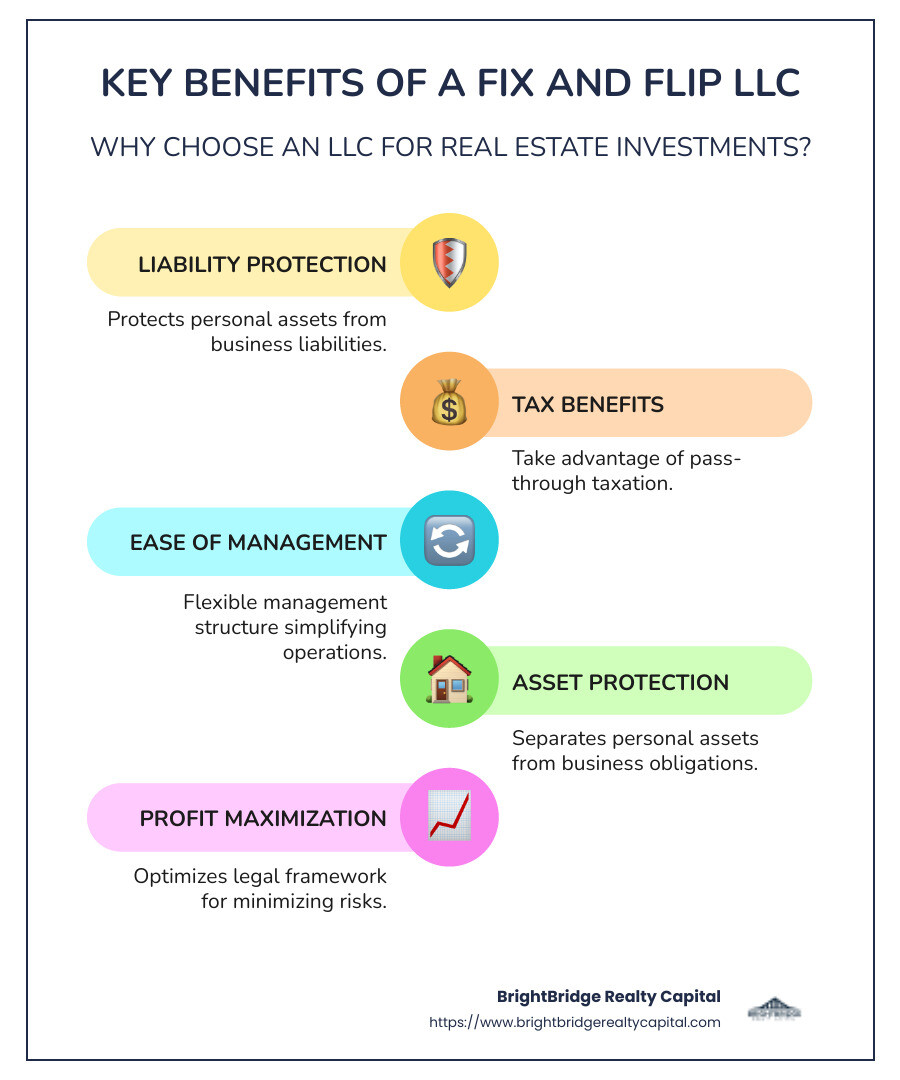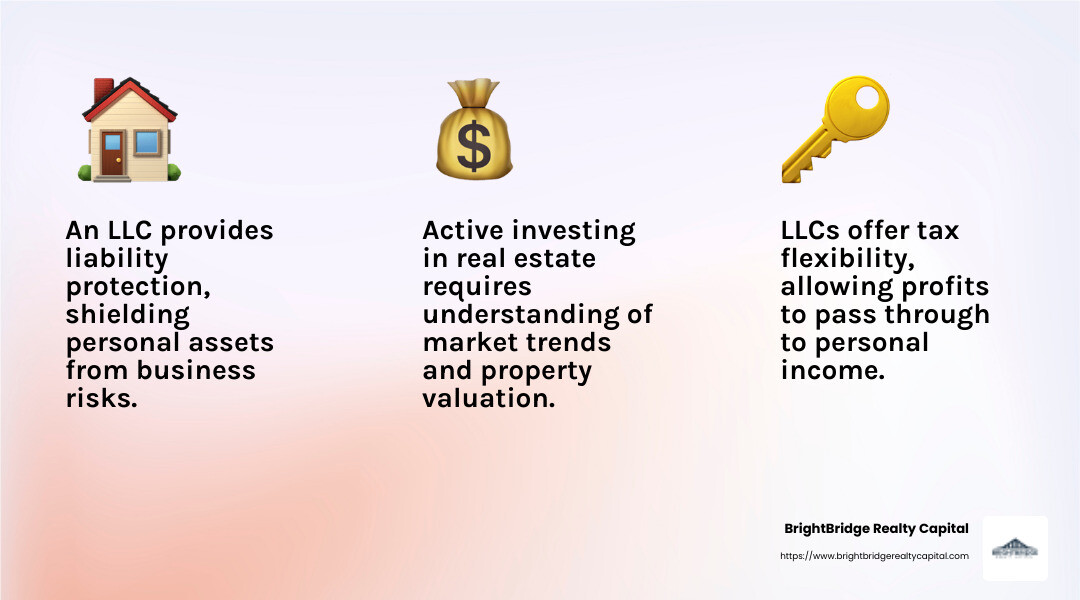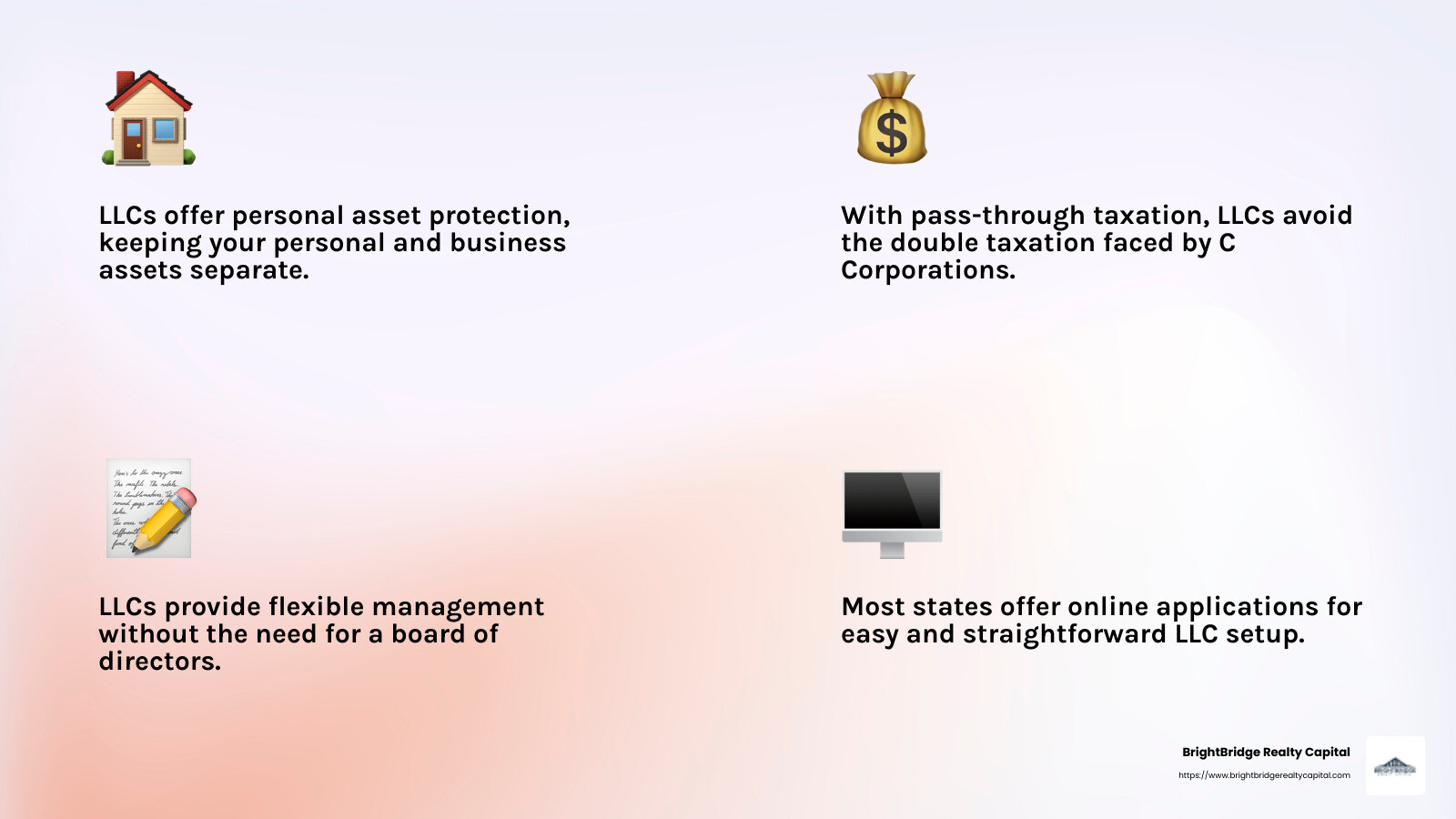LLC Essentials: Safeguard Your Fix and Flip Ventures

Fix and flip LLC is a buzzword many real estate investors frequently encounter, and for good reason. Investing in real estate can be a lucrative venture, but it comes with its own set of challenges and risks. Establishing a Limited Liability Company (LLC) for your fix and flip projects is a strategic move that many seasoned investors use to steer these challenges effectively.
Here’s a quick rundown for those in a hurry:
- Liability Protection: An LLC helps safeguard personal assets from business debts and legal claims.
- Tax Benefits: Take advantage of pass-through taxation to potentially reduce your tax burden.
- Ease of Management: LLCs offer flexible management while still being easy to set up.
Setting up an LLC can provide you with the robust legal framework necessary to minimize risks and maximize profits in your real estate endeavors. As we explore deeper into the benefits and processes, the right company structure is crucial to your success in the world of property flipping.

Fix and flip llc terms you need:
Understanding the Basics of a Fix and Flip LLC
When diving into fix and flip LLC, understanding the basics is essential for your success. Let's break down the key components: liability protection, tax benefits, and active investing.
Liability Protection
One of the biggest advantages of forming an LLC for your fix and flip projects is liability protection. This means your personal assets—like your home or savings—are generally shielded from any legal or financial troubles your business might encounter. If your LLC faces lawsuits or debts, only the business assets are typically at risk. This separation provides peace of mind and financial security, which is crucial when dealing with high-stakes real estate investments.

Tax Benefits
Taxation can be a significant concern for real estate investors. Fortunately, an LLC offers some attractive tax benefits. With pass-through taxation, the LLC itself isn't taxed. Instead, profits are passed directly to the owners and taxed at their personal income tax rates. This avoids the double taxation that corporations often face.
Additionally, LLCs offer flexibility in how they are taxed. You can choose to be taxed as a sole proprietorship, partnership, or even as a corporation, depending on what best suits your financial situation. This flexibility can lead to substantial savings, especially if you consult with a tax professional to determine the most advantageous tax status for your business.
Active Investing
In the field of real estate, fix and flip ventures are considered active investments. This means you're not just sitting back and waiting for your property to appreciate. Instead, you're actively involved in purchasing, renovating, and selling properties for a profit.
An LLC supports this active involvement by providing a structured approach to managing your business operations. You can directly manage the business or appoint managers, ensuring that your fix and flip projects run smoothly and efficiently.
Forming a fix and flip LLC not only protects your personal assets and offers tax advantages but also supports the active nature of real estate investing. This combination of benefits makes it an appealing choice for many investors looking to make their mark in the property market.
We'll explore the steps to setting up your LLC and how to maximize its benefits for your fix and flip ventures.
Setting Up Your Fix and Flip LLC
Ready to set up your fix and flip LLC? Let's explore the essential steps you'll need to take to get your business up and running smoothly.
State Selection
First things first, choose the state where you'll form your LLC. While many opt for their home state, some states offer more favorable conditions for businesses. For example, states like Delaware or Nevada are popular due to their business-friendly regulations and tax advantages. However, if you plan to flip houses in a specific state, it might be easier to form your LLC there to avoid additional taxes and paperwork.
Online Application
Once you've chosen a state, you can usually apply online to form your LLC. This process involves filling out some basic information about your business, such as its name, address, and the name of the registered agent. Most states have a simple online system that makes this step straightforward and quick.
Operating Agreement
Even if it's not required by your state, drafting an Operating Agreement is a wise move. This document outlines how your business will be run, including details on profit distribution and decision-making processes. It's like having a playbook for your business, and it can be a lifesaver if disputes arise among members.
Employer Identification Number (EIN)
If you plan to hire employees or want to open a business bank account, you'll need an EIN. You can easily apply for this online through the IRS website. Think of it as a Social Security number for your business—it's essential for handling taxes and other legal matters.
Business Insurance
Insurance is crucial for protecting your investment. Consider getting general liability insurance to safeguard against potential lawsuits. If you have employees, worker's compensation and disability insurance are also necessary. Even if you're working solo, property insurance can protect your assets from unexpected damages.
Bank Account
Finally, open a business bank account. This helps keep your personal and business finances separate, making it easier to manage your cash flow and track expenses. A business credit card can also be handy for covering renovation costs and earning rewards on purchases.
By following these steps, you'll be well on your way to establishing a solid foundation for your fix and flip LLC. Each step ensures your business is legally compliant and financially secure, setting you up for success in the exciting world of real estate investing.
Benefits of Using an LLC for Fix and Flip Ventures
When you're diving into fix and flip LLCs, understanding the benefits can help you make informed decisions. Let's break down why an LLC might be your best bet for protecting and growing your real estate investments.
Personal Asset Protection
One of the biggest perks of an LLC is personal asset protection. In simple terms, this means your personal belongings—like your home or car—are safe if something goes wrong with your business. If a legal issue arises, only the assets within the LLC are at risk. This separation is crucial in the high-stakes world of real estate, where unexpected challenges can pop up.
Tax Advantages
LLCs offer some nifty tax advantages. With pass-through taxation, the business itself doesn't pay taxes. Instead, profits pass directly to the owners, who then report them on their personal tax returns. This avoids the dreaded double taxation that C Corporations face. Plus, you might find additional tax deductions available for business expenses, which can save you money at tax time.
Flexible Management
Running a fix and flip LLC comes with flexible management options. Unlike corporations, which require a board of directors and formal meetings, LLCs let you decide how to run the show. Whether you want a hands-on approach or prefer to delegate, an LLC can accommodate your management style. This flexibility is ideal for flipping projects where quick decisions are often needed.
Easy Setup
Setting up an LLC is easy and straightforward. Most states offer online applications that simplify the process. You won't be bogged down with the extensive paperwork and formalities required for corporations. This ease of setup means you can focus more on finding and flipping properties rather than getting lost in bureaucratic red tape.

In summary, forming a fix and flip LLC can provide peace of mind with asset protection, offer tax savings, adapt to your management style, and get you up and running with minimal hassle. As you venture into real estate, these benefits can make a significant difference in your business's success.
Drawbacks and Considerations for Fix and Flip LLCs
While a fix and flip LLC offers many benefits, it's important to also consider the potential drawbacks. Understanding these challenges can help you make informed decisions about whether an LLC is the right choice for your real estate ventures.
Tax on Earnings
One thing to keep in mind is the tax on earnings. Even if you don't receive your share of the profits immediately, you're still taxed on it. This can be a surprise for some investors who expect taxes only on money in hand. Make sure you plan for this when budgeting for your projects.
Tax Delays
Another consideration is tax delays. As an LLC owner, you need to wait for a K-1 form before filing your personal tax return. This form reports your share of the LLC's income, deductions, and credits. The delay in receiving this form can be frustrating, especially if you prefer to file early. It's a small inconvenience, but one worth noting.
Extra Fees
Finally, consider the extra fees associated with running an LLC. Some states, like California, charge additional fees just for operating an LLC. These fees can add up, especially if you're flipping multiple properties. Be sure to research your state's specific requirements and factor these costs into your financial planning.
In summary, while a fix and flip LLC offers many advantages, weigh these against the potential drawbacks. Understanding the tax implications and additional costs will help you decide if an LLC is the best fit for your real estate flipping strategy.
Alternatives to LLCs for Fix and Flip Businesses
While an LLC is a popular choice for many real estate investors, it's not the only option. Let's explore some alternatives: S Corporations, C Corporations, and Sole Proprietorships. Each has its own set of benefits and drawbacks, so it's important to understand how they might fit into your fix and flip strategy.
S Corporations
An S Corporation can be a great option if you're looking for tax benefits similar to an LLC. Like an LLC, an S Corporation allows for pass-through taxation. This means that the income is passed directly to the shareholders, avoiding the double taxation seen in C Corporations.
However, S Corporations come with more rules. For example, they have restrictions on the number and type of shareholders. All shareholders must be U.S. citizens or residents, and there can't be more than 100 of them. If you plan on keeping your venture small, this might not be a problem. But if you're looking to grow, these restrictions could become a hurdle.
C Corporations
C Corporations offer the most robust liability protection. They treat the business as a separate legal entity, which can be appealing if you're concerned about personal liability. However, this comes at a cost: double taxation. The corporation pays taxes on its profits, and then shareholders also pay taxes on dividends.
C Corporations also require more formalities, like having a board of directors and holding annual meetings. This structure might be overkill for a small fix and flip operation, but it could be beneficial if you plan to scale up significantly.
Sole Proprietorships
A Sole Proprietorship is the simplest form of business. It's easy to set up and has minimal regulatory requirements. However, it doesn't offer any liability protection. Your personal assets are at risk if something goes wrong with your fix and flip project.
This option might work if you're just starting out and want to keep things simple. But as you grow, the lack of liability protection could become a significant concern. Consider transitioning to an LLC or corporation as your business expands.
In conclusion, while a fix and flip LLC is a common choice, exploring these alternatives can help you find the best fit for your business needs. Each structure offers unique benefits and challenges, so weigh them carefully against your goals and resources.
Frequently Asked Questions about Fix and Flip LLCs
Do you need a business license to flip houses?
Yes, you often need a business license to flip houses. Real estate regulations vary by state and locality, so it's crucial to check the specific requirements in your area. A business license ensures that you are operating legally and adhering to local regulations. Without it, you might face fines or legal issues.
Can you flip houses without an LLC?
Absolutely, you can flip houses without an LLC. However, it's important to consider the risks and benefits. Operating as a Sole Proprietorship is the simplest way to start, but it offers no liability protection. Your personal assets could be at risk if something goes wrong. Other business entities, like S Corporations or C Corporations, can also be used for house flipping. These options may offer tax benefits or liability protection but come with more complexity. Weighing these factors can help you decide the best structure for your business.
What is the 70% rule in house flipping?
The 70% rule is a guideline used by real estate investors to determine the maximum price they should pay for an investment property. It suggests that you should not pay more than 70% of the property's after-repair value (ARV) minus the cost of repairs.
For example, if a home's ARV is $200,000 and the repairs will cost $30,000, the maximum price you should pay is $110,000:
[ \text{Maximum Offer} = (ARV \times 0.70) - \text{Repair Costs} ]
This rule helps ensure that you can make a profit after flipping the house. It's a useful tool for maintaining profitability and managing risk in your fix and flip ventures.
Conclusion
In fix and flip ventures, setting up an LLC can be a game-changer. It offers liability protection, tax advantages, and a flexible management structure. But the journey doesn't stop there. Navigating the real estate market requires not just the right business structure but also the right financial partner.
This is where BrightBridge Realty Capital comes into play. We specialize in providing customized real estate financing solutions nationwide. Our unique selling point? Quick and seamless funding, often closing deals within a week. This speed and efficiency mean you can seize opportunities as they arise, without the usual headaches.
By cutting out intermediaries, we offer competitive rates and a streamlined process. Whether you're a seasoned investor or just starting out, our team is here to support your fix and flip ventures with the financial flexibility you need.
Ready to explore your options? Learn more about our real estate financing solutions here. Let's make your next fix and flip project a success!


